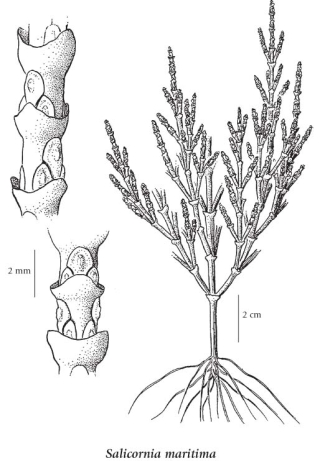Salicornia depressa Standl.
maritime glasswort (slender grasswort)
Amaranthaceae (Amaranth family)
(Previously in Chenopodiaceae)
Introduction to Vascular Plants
maritime glasswort (slender grasswort)
Amaranthaceae (Amaranth family)
(Previously in Chenopodiaceae)
Introduction to Vascular Plants
Species Information
General:
Annual herb from a fibrous root; stems decumbent to erect, solitary, simple to freely branched, 5-50 cm tall/long, glabrous, fleshy, often reddish with age.
Leaves:
Stem leaves reduced to opposite, scalelike, fused bracts; lower scales slightly spreading, obtuse to rounded.
Flowers:
Inflorescence of fleshy spikes, the flowers sunken in depressions of the joints just above the axils and opposite the fused bracts, the joints of the spike 2.5-4 (rarely 2) mm long and half as thick as the spikes; flowers in groups of 3, central flowers in each cluster much exceeding the lateral ones; spikes 2-5 cm long.
Fruits:
Thin, papery-walled, membranous bladders enclosed by spongy flower scales, egg- to diamond-shaped; seeds 1 per bladder.
Illustration

If more than one illustration is available for a species (e.g., separate illustrations were provided for two subspecies) then links to the separate images will be provided below. Note that individual subspecies or varietal illustrations are not always available.
Illustration Source: The Illustrated Flora of British Columbia
Habitat and Range
Wet salt marshes, shorelines and saline and alkaline flats in the lowland, steppe and montane zones; infrequent in S BC; N to AK, YT and NT, E to NF and S to GA, KS, NV and CA.Status Information
Synonyms
Synonyms and Alternate Names:
Salicornia europaea sensu Wolff & Jefferies, non L.
Salicornia europaea auct. non L.
Salicornia europaea subsp. europaea
Salicornia europaea var. pachystachya (W.D.J. Koch) Fernald
Salicornia europaea var. prostrata auct. non (Pallas) Fern. [misapplied]
Salicornia europaea var. simplex (Pursh) Fernald
Salicornia herbacea auct. non (L.) L.
Salicornia maritima Wolff & Jefferies
Salicornia maritima Wolff & Jefferies
Salicornia prostrata auct. non Pall.
Salicornia ramosissima auct. non J. Woods
Salicornia virginica L.
Taxonomic Keys
Refer to the treatment in Flora North America for a key to glassworts, and further descriptive information.
|